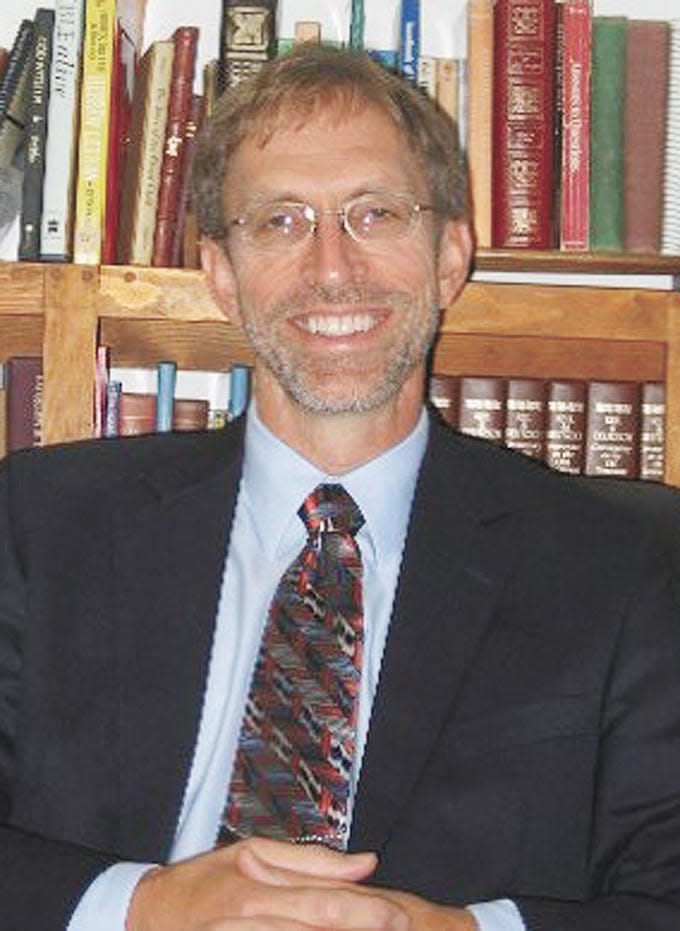Shayne Looper: Faith, politics, and the problem of selective sight
- Oops!Something went wrong.Please try again later.
Another election year, and it’s going to get ugly. As the citizen of a liberal democracy, I know we must have elections, but as the pastor of a church I came to dread them. People I have known to be kind and polite undergo a metamorphosis. They criticize, rant, and make snide remarks about politicians and all those foolish enough to vote for them.
During general election years, it seems as if people develop vision problems: one eye goes blind and the other develops X-ray vision. With their X-ray vision eye, they can see right through people, especially those who hold political views that differ from their own. They see right down to their opponent’s evil motives.

At the same time, they are blind to the failures of their political favorites. Does this candidate lie? Well, everyone lies; that’s just politics. Are their morals suspect? Well, no one is perfect. Do they use foul language, level threats, and act out of anger? Well, we need someone who is strong to fight for us.
Perhaps it is going too far to call them blind. It is not exactly that they cannot see these things; they choose not to look at them. They remove the things that make them uncomfortable from sight. They know they are there, but as long as they do not have to see them, they can ignore them.
I write as if this condition were true of other people but that I have somehow transcended it. I have not, and I doubt that anyone else has either. For me, this intellectual double vision does not manifest itself in the political realm as much as in other areas. For example, someone else’s character flaws might be crystal clear to me. My own, which are so clear to others, can escape my notice.
This troubling condition extends beyond politics and character flaws. It also affects people in their religious and spiritual lives. I’ve seen this in people who call themselves Buddhist. They have an image of the Buddha somewhere in their home and practice a couple of minutes of meditation when it is convenient. But the disciplines and attitudes that characterize serious Buddhists – the practices of the eight-fold path – are missing.
I am sure this kind of thing is true in all religions, but because I am a Christian, I have seen it most often among my own people and most troublingly in my own life. Jesus was aware of this all too human tendency and addressed it on numerous occasions.
In the Gospel of Mark, some religious leaders initiate a conflict with Jesus by caviling about his disciples’ behavior. He responds by pointing out something they were blind to: their habit of setting aside biblical instruction when it proved inconvenient. He said to them, “You have a fine way of setting aside the commands of God in order to observe your own traditions!”
Setting aside what is inconvenient. Not exactly denying it, but putting it on the shelf, removing it from sight. If it is on the shelf, we can say that we own it, have benefitted from it and value it, but we do not need to be bothered by it.
Jesus went even further when he spoke to the crowds at one of Judaism’s greatest religious festivals: the Passover. In this context, he did not speak of setting aside God’s commands but of setting aside God’s own Son. He warned, “There is a judge for the one who rejects me.”
That is the way the majority of modern Bible versions translate it, but the verb is identical to the one Jesus used when he accused the religious leaders of “setting aside” the commands of God. Most people, even those who have rejected institutional Christianity, would not say they have rejected Jesus. But what about setting him aside, putting him on the shelf, where he is not in the way?
Putting Jesus on the shelf manifests itself in many ways, including political hysteria, moral failure, and ordinary fears. It is the opposite of what it means to “confess Jesus Lord,” and it always leads to trouble in the lives of those who claim to be his followers.
— Shayne Looper is a writer and speaker based in Coldwater, Michigan. Contact him at salooper57@gmail.com.
This article originally appeared on The Holland Sentinel: Shayne Looper: Faith, politics, and the problem of selective sight

